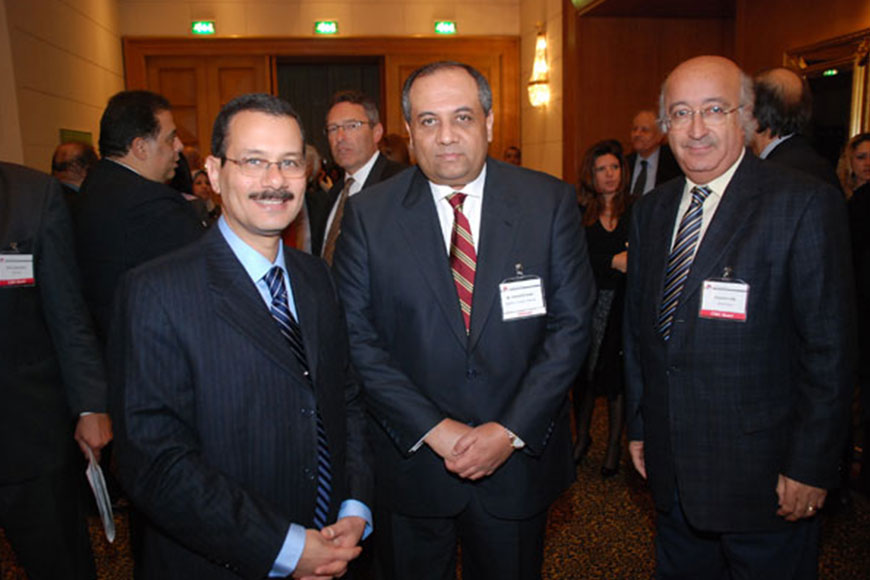
Date
Speaker(s)
Designation
Description
Government Reforms….Canadian & Foreign Investment in Egypt
CEBC started the year 2010 with a roundtable discussion on Egyptian government reforms, Canadian and foreign investment in Egypt. The meeting was attended by around one hundred committed business figures representing different business sectors.
Mr. Motaz Raslan the Council’s Chairman started his opening remarks by welcoming his distinguished speakers, H.E. Dr. Ahmed Darwish, Minister of Administrative Development, H.E. Ferry de Kerckhove, Ambassador of Canada to Egypt, Mr. Ossama Saleh, Chairman, General Authority for Investment and Free Zones, Mr. Ashraf El Araby, Chairman of the Egyptian Taxation Authority and Counselor Khaled Imam Chief of Economic Courts representing the Ministry of Justice. The discussion was moderated by Mr. Hassan Hussein, Chairman, HH Investments Holding Limited and Chair of the CEBC Investment Committee.
Mr. Raslan highlighted the success of creating and enhancing the business environment in Egypt by private sector’s engagement in civil society in the planning and implementation processes. Considering that the private sector contributes to 70 percent of the Egyptian economy and it is the duty of business leaders to set the standards for better business practices further developing foreign and domestic investments, “We have to praise the economic reforms being made to restore a climate of business confidence in Egypt”, he commented.
He also mentioned the fact that during 2009 the World Bank has selected Egypt among the seven best countries in the world that have taken effective measures on economic reform and developing the investment climate, “Unfortunately when it comes to business operations, Egypt is still ranked as 140 out of 183 economies, in enforcing business contracts, as well as 140 out of 183 economies, in paying taxes according to the World Bank 2010 business report”.
Ambassador Ferry de Kerckhove then taking the floor started by expressing his satisfaction towards the business partnership between CEBC and the Canadian Embassy in Egypt, especially in promoting bilateral business and economic development between Egypt and Canada.
Commenting on the topic of discussion he said “For me, this is a very important topic, both personally and professionally. Although trade is important and we monitor our export figures closely, for me investment is much more important in the longer term in developing our bilateral relationship. Investment by a foreign firm represents a substantial and long-term commitment to the future of Egypt, much more than the simple sale of commodities, machinery or services”.
Ambassador Ferry emphasized on how international trade has developed all the way since the 80s until now, “In the late 1980’s and into the 1990’s we started to understand the value of foreign investment coming into Canada, the creation of employment, the transfer of technology, the dynamism which came from the inflow of qualified people, and the generally positive effects which come from new players in an economy but we still did not think in terms of encouraging Canadian firms to invest overseas”, said Ambassador Ferry.
“Any investor would want to make sure that the rules will be applied consistently and fairly in compliance with laws, and that once a contract has been signed and approvals have been taken from the relevant authorities, those rules will not be changed and other government entities will not interfere in the execution of the project. Looks fundamental …it is fundamental”, commented the Ambassador on the issue of Canadian investors’ concerns when investing abroad.
In closing, Ambassador Ferry suggested applying the system of a one-stop office to be established to help investors. This office would be responsible for guiding investors through the maze of regulatory challenges, dealing with different authorities on behalf of the investor, and would generally serve to facilitate the investor’s work. More importantly, this one-stop office must have the authority and power to guarantee that all government agencies, at all levels, will comply with whatever contract has been signed by the foreign investor. The office would also verify that the investor abides by the local laws and regulations. If an investor runs into problems with the local administration or with security authorities, the office would intervene to solve the matter. In short, this office must speak on behalf of the Government of Egypt in its totality and ensure without question that all departments respect the contracts which have been approved for foreign investment.
“I believe that the establishment of such an office, with real power and influence, would be a major step in addressing the concerns of Canadian investors. It would also have an indirect benefit in cutting the useless middlemen and weed out the unreliable local representatives thus ensuring that only credible, indispensable local contractors, representatives, or agents, are selected”, concluded the Ambassador.
Counselor Khaled Imam, Chief of the Economic Courts, briefed the audience on the government legislation system and judicial reforms carried out lately by the Ministry of Justice. He introduced to what might be new to the audience, the economic courts systems and how they function, these courts have been established by law number 120 in the year 2008 consisting of two kinds of judges, firstly those who are preparing the cases before they go to courts, the second are those who have the jurisdiction over the disputes and the cases. These courts are for the emergency cases, issuing acts and petitions as well.
Since “taxes” is one of most important topics any investor requires to comprehend, Mr. Ashraf El Araby, shared the panel to highlight some of the investors main issues of concern, he started off by giving the audience a brief on the taxation system, formation and process in Egypt. He highlighted the need to have a kind of a position paper distributed among different ministries with the concerns of investors and the impediments of the investment process they face in addition to establishing a kind of a council to work along with the different ministries making sure each is delivering the required quality services especially in facilitating the operational issue.
Since 2004, the cabinet started to reform the fiscal system starting with custom laws. The custom tariffs being very high were reformed in two phases noting that the average custom rate is 6 percent which makes Egypt now complying in full with the GATT agreement getting the customs tariffs down to the minimum. In a year time of the cabinet’s appointment, a new income tax law has been brought in and the minister of finance supported taking the tax rate from 42 percent to 20 percent, making sure it was comparable to the laws used in the International European advanced countries. Currently work is being carried on in developing the income tax making it more attractive and simplified for the investor.
Mr. Ossama Saleh, Chairman of GAFI then started his speech by recapping the main responsibilities of GAFI as a regulator and a place for establishing corporations in addition to following up on the procedures of corporate doing business. “It is the soul corporate regulator in this country”, emphasized Mr. Ossama.
GAFI also manages the free and investment zones, there are 9 public free zones and 200 private free zones including more than 220 thousand employees contributing to 15 to 20 percent of Egypt’s exports and recently got the approval from the Prime Minister to establish 12 new investment zones.
GAFI also promotes investment in Egypt, it is responsible with the FDA and other ministries, for investment promotions based on the government’s plan on an annual basis. It also facilitates and introduces new platforms for SME’s working with GAFI to establish their companies by giving them training on entrepreneurship skills and teaching them a little about access to finance.
Egypt was previously ranked 126 in starting businesses and in two years time Egypt managed to be ranked 24 amongst all the countries. GAFI has managed to establish companies with a maximum of 72 hours in collaboration with all ministries and authorities under one umbrella fully authorized to provide approvals spontaneously for establishing them in Egypt.
One of the issues GAFI is still working on is the licensing procedures, where amendments have been made for establishment procedures, general assembly procedures, company liquidation and the limited enterprise. Concerning investment promotion within the global economic crisis, Egypt was successful in maintaining at least minimum percentages of growth. The government has managed to pick up 47 mega projects just for infrastructure, oil and gas services, transportation, all pushing the economy forward. Mr. Ossama sees that significant improvement has been made to the system in establishing companies to the extent that one can now establish a company online. Further more GAFI has a policy committee which is responsible for resolving problems between the companies and the government, the committee is formed of representatives from different government sectors. A dispute resolution center has been established and the economic courts have been introduced, all being effective tools in favor of promoting investment
H.E. Dr. Ahmed Darwish, Minister of Administrative Development started his remarks by talking about the government’s investment intent, a topic very dear to this government as it was the vision set in 2004 when Dr. Nazif took the responsibility of the cabinet. “The chain of sequences is very simple; more investment means more jobs, and more jobs means welfare and prosperity for the people of Egypt. From another point of view more investment and more businesses mean more taxes. More taxes mean more resources to the public budget and more money that will be placed in the social safety net which one more time, is the prosperity and welfare of the Egyptians”, commented Dr. Darwsih. In addition he stated that the cabinet has decided that good governance is the tool that will be used to increase the investments.
Has Egypt gained steps in good governance? apparently it has. The OECD has lately decided to accept Egypt giving it an observation membership in the public governance committee, which is definitely not something easy to achieve. Formerly Egypt has taken the memberships of IT committees and Investment committees.
The minister also highlighted the importance and the difference between perception indices and measured indices where dealing with perception directly questions the masses and it usually depends on the expectations of the public, while considering measurement indices leads to the seven stages the investor goes through.
Global Integrity which is an international organization raised the index of Egypt’s taxes and customs from weak to good, raising them two levels, “We have closed all doors which could accuse us of corruption”, said the Minister.
Following the minister’s remarks, Mr. Hassan Hussein, Chairman of HH Investments Holding Limited and Chair of the CEBC Investment Committee, wrapped-up the discussion, summing up the suggestions and problems raised by the discussants and the panelists, promising to organize a follow-up meeting in the near future to complete and discuss further the steps taken with regards to the issues covered.
The floor was then opened to questions from the floor covering different topics such as the importance of embracing competition and leveraging Egypt’s competitive advantage, economic courts and the timeframe taken to solve disputes and impediments facing some foreign companies upon starting their operations.



















